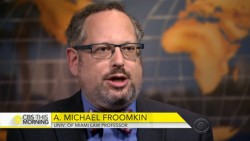Magistrate Judge James Orenstein of the E.D.N.Y has issued a 50-page order in a case similar to the Apple v FBI case that has been in the news. In this case too, the government sought to have Apple defeat the passcode security limit on an iPhone so the government could extract the data pursuant to a valid search warrant.
The opinion is a slam-dunk win for Apple, rejecting the government’s All Writs Act (AWA) request on multiple grounds. Among them is that Apple does not meet the test in the leading Supreme Court precedent, New York Telephone due to Apple’s distance from the alleged crime and the burden to Apple of complying. There’s two constitutional arguments: one on separation of powers, that an absence of prohibition by Congress should not be treated as permission, and one on the implications of the government’s expansive view of the AWA, under which any of us could be conscripted to do things we might hate doing to help the government in investigations or worse. (Judge Orenstein gives the I hope extreme example of a drug company forced to produce an execution drug against its will if the government has no other source of supply.)
Apple also wins on discretionary grounds.
This opinion is a thoughtful and on just about all points persuasive work, and it should be influential as these cases trundle through the legal system.

 The government’s attempt to get Apple to build a bespoke operating system so they can brute force access to an iPhone without it erasing its data has led the media to some of us who were in the first round of the crypto wars. Today was my turn. A few seconds on
The government’s attempt to get Apple to build a bespoke operating system so they can brute force access to an iPhone without it erasing its data has led the media to some of us who were in the first round of the crypto wars. Today was my turn. A few seconds on